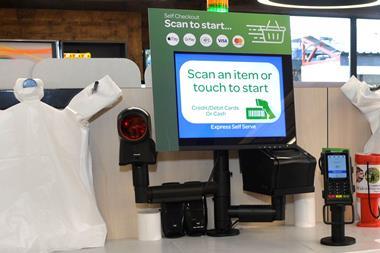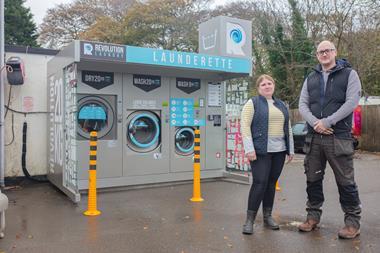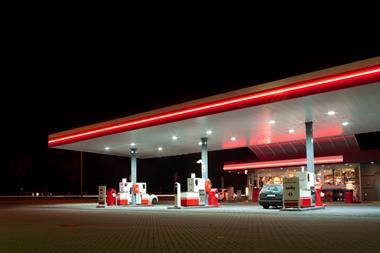Where’s the compensation?
Despite the fact that we live in a risk adverse/compensation culture for example, large lady falls over in store because she cannot see her feet and watch out for a just-as-large claim. It doesn’t quite work that way for retailers whose businesses are hit by roadworks. If the electricity company digs up the road outside your shop there is no statutory requirement for compensation as Cambridgeshire forecourt operator Jonathan James recently said in one of his own columns. Access to one of his sites was closed for a week and, when EDF hit a mains cable, a power surge wiped out his tills and terminals. Since he had no customers, it ’didn’t matter’ all that much. His business was on the floor anyway. But he’d like to hear from other retailers suffering similar problems (email him at jonathan@jamesgraven.com) as he is looking to mount some sort of collective action. He can, sort of, spread his losses because he has several sites; a single site operator could not, and could go out of business.
If the disruption is caused by water, sewage or gas works, there can be compensation. This is what Eric Wilson is hoping for. His site, t/a EWL in Greater Manchester, has been hit by water works. The Compensation for Business Disruption Water Industry Act 1991 allows businesses to claim for losses; however the wording of the Act is vague and interpreted differently by different water companies. So he is playing a waiting game at present.
Meanwhile, enterprisingly, he is sending staff outside (with lots of change) to the big sign that says he’s still there, when the stop-go lights turn red, with a tray of quick offers confectionery and crisps, soft drinks, newspapers. He’s not making much money but is making a bit of an impact. "We are actually getting regulars," he says. "But it’s not enough." He can also claim a rates reduction owing to loss of business due to no fault of his own. It’s worth a try.
Have one for the road
Continuing on my journey to bring you the latest in bio-news, I report that Edinburgh Napier University clearly an enterprising place has developed a new biofuel made from whisky by-products.
Whisky ’petrol’ for cars could be available on Scottish petrol forecourts soon (it sez ’ere on my research website). It is the result of two years’ work by the university’s biofuel research centre.
The £260,000 project (blimey, cheap!) was funded by Scottish Enterprise’s Proof of Concept programme, which helps researchers export ideas from the lab to the marketplace.
The team focused on the whisky industry to develop biobutanol, the next generation of biofuel which gives 30% more output power than ethanol.
It uses the two main by-products of the whisky production process which are ’pot ale’, the liquid from the copper stills, and ’draff’, the spent grains.
Apparently, each year the whisky industry produces 1,600 million litres of pot ale and 187,000 tonnes of draff.
Unlike ethanol, the nature of this innovative new bio-fuel means that ordinary cars could use the more powerful fuel, instead of traditional petrol.
As part of the research, the centre was provided with samples of whisky distilling by-products from Diageo’s Glenkinchie Distillery in Edinburgh. Director of the biofuel research centre at Edinburgh Napier University, Professor Martin Tangney, said: "The EU has declared that biofuels should account for 10% of total fuel sales by 2020. We’re committed to finding new, innovative renewable energy sources."
One wonders about the duty question though.
A note about our times
Here is an interesting parable on how what goes around comes around. It was sent to me by jwebb aka ’Murco Man’ on email. I don’t have a clue who he is (but I like him) and he apparently wants to keep it that way.
I live in hope that I may yet hear from Jet Pack, Shelley Gal and B Positive!
This is the tale. It is raining, and the little town looks totally deserted. It is tough times, everybody is in debt, and everybody lives on credit. Then a rich tourist drives into town. He goes into the only hotel, laying a 100 euro note on the reception desk and goes upstairs in order to pick a room.
The hotel proprietor takes the 100 euro note and runs to pay his debt to the butcher.
The butcher takes the note, and runs to pay off what he owes to the farmer who supplied the meat. The farmer runs to pay off his feed and fuel bills.
The fuel supplier (remember, this is a parable) takes the 100 euro note and runs to pay his debt to the town prostitute who, in these hard times, gave her service on credit. The hooker runs to the hotel, and pays off her debt with the 100 euro note to the hotel proprietor to pay for the rooms that she rented when she brought her clients there.
The hotel proprietor then lays the 100 euro note back on the counter so that the rich tourist will not suspect anything.
At that moment, the rich tourist comes down after inspecting the rooms, and takes his 100 euro note, saying that he did not like any of the rooms, and leaves town.
No one earned anything. However, the whole town is now without debt, and looks to the future with a lot of optimism.
Does this remind you of the way some of the world economy works?






























No comments yet